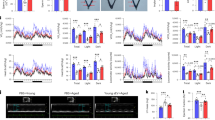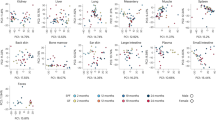Abstract
THE common symptoms in rats on a choline-deficient diet are, as is well known, fatty liver, impeded growth, and in young animals renal hæmorrhages (for references see Best1). There has been discussion as to whether the vitamin character of choline is due only to its content of labile methyl groups, or if the lipotropic action has a more specific mechanism. The experiments reported below show that an impairment of oxidative metabolism is an early symptom in choline deficiency.
This is a preview of subscription content, access via your institution
Access options
Subscribe to this journal
Receive 51 print issues and online access
$199.00 per year
only $3.90 per issue
Buy this article
- Purchase on Springer Link
- Instant access to full article PDF
Prices may be subject to local taxes which are calculated during checkout
Similar content being viewed by others
References
Best, C. H., and Lucas, C. C., "Vitamins and Hormones", 1, 1 (1943).
Griffith, W. H., and Wade, N. J., J. Biol. Chem., 131, 567 (1939); 132, 627 (1940).
Author information
Authors and Affiliations
Rights and permissions
About this article
Cite this article
ABDON, NO., BORGLIN, N. Disturbances in Oxidative Metabolism in Choline Deficiency. Nature 158, 793–794 (1946). https://doi.org/10.1038/158793a0
Issue Date:
DOI: https://doi.org/10.1038/158793a0
This article is cited by
Comments
By submitting a comment you agree to abide by our Terms and Community Guidelines. If you find something abusive or that does not comply with our terms or guidelines please flag it as inappropriate.



